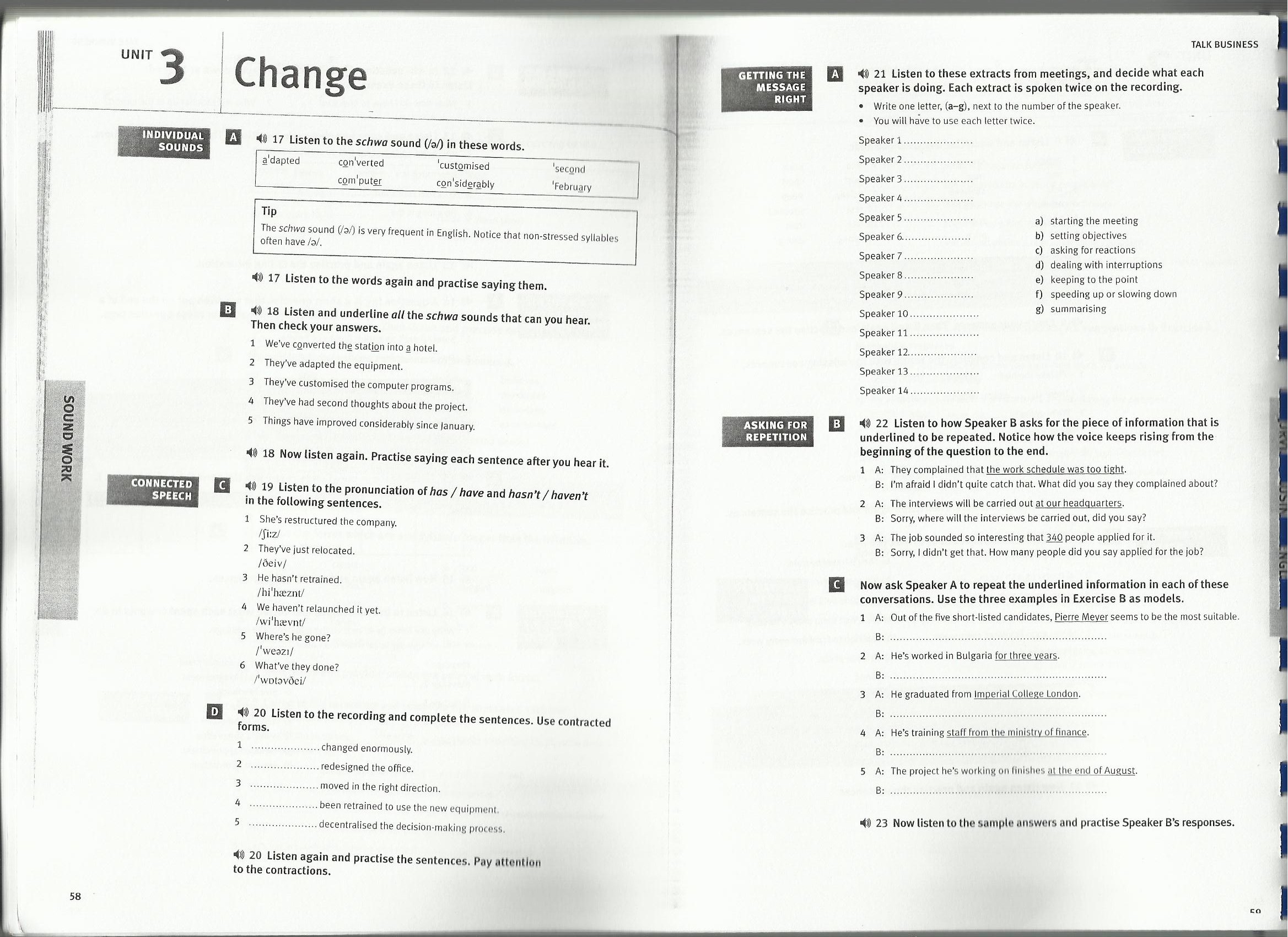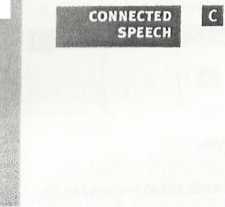cw0030

UNIT


SOUND WORK

4)) 17 Listen to the schwa sound (/o/) in these words.
a'dapted con'verted 'customised 'second
com'puter con'siderably 'February
Tip
The schwa sound (/o/) is very frequent in English. Notice that non-stressed syllables often have h/.
4) 17 Listen to the words again and practise sayingthem.
□ 4) 18 Listen and underline all the schwa sounds that can you hear.
Then check your answers.
1 We’ve converted the station into a hotel.
2 TheyVe adapted the equipment.
3 They’ve customised the Computer programs.
4 They’ve had second thoughts about the project.
5 Things have improyed considerably sińce (anuary.
4) 18 Now listen again. Practise saying each sentence afteryou hear it.
4) 19 Listen to the pronunciation of/7os//7ove and hasn’t/haven’t in the following sentences.
1 She’s restructured the company.
/Ji:z/
2 They’ve just relocated.
/óeiv/
3 He hasift retrained.
/hi'hasznt/
4 We haven’t relaunched it yet.
/wi'h<evnt/
5 Where’s he gone?
/' weozi/
6 What’vetheydone?
/'wDtovóci/
Q 4) 20 Listen to the recording and complete the sentences. Use contracted forms.
1 .....................changed enormously.
2 .....................redesigned the Office.
3 .....................moved in the right direction.
4 .....................been retrained to use the new equipment.
5 .....................decentralised the decision-making proces1..
4) 20 Listen again and practise the sentences. P.iy attontlon to the contractions.
Q 4)) 21 Listen to these extracts from meetings, and decide what each speaker is doing. Each extract is spoken twice on the recording.
• Write one letter, (a-g), next to the number of the speaker.
• You will have to use each letter twice.
Speaker 1.....................
Speaker 2.....................
Speaker 3.....................
Speaker A.....................
Speaker 5..................... a) starting the meeting
Speaker 6..................... b) setting objectives
Speaker 7 c) asking for reactions
d) dealing with interruptions
Speaker 8..................... e) ^egpjng t0 the point
Speaker 9..................... f) speeding up or slowing down
Speaker 10..................... s) summarising
Speaker 11.....................
Speaker 12.....................
Speaker 13.....................
Speaker 14.....................
EJ 4)) 22 Listen to how Speaker B asks for the piece of information that is underlined to be repeated. Notice how the voice keeps rising from the beginning of the question to the end.
1 A: Thev complained that the work Schedule was too tight.
B: l’m afraid I didn't quite catch that. What did you say they complained about?
2 A: The interyiews will be carried out at our headauarters.
B: Sorry, where will the interviews be carried out, did you say?
3 A: The job sounded so interesting that 340 people applied for it.
B: Sorry, I didn’t get that. How many people did you say applied for the job?
Q Now ask Speaker A to repeat the underlined information in each of these conversations. Use the three examples in Exercise B as models.
1 A: Out of the five short-listed candidates, Pierre Meyer seems to be the most suitable.
B: ...................................................................
2 A: He’s worked in Bułgaria for three years.
B: ...................................................................
3 A: He graduated from Imperial College London.
B: ...................................................................
4 A: He’s training Staff from the ministry of finance.
B: ..................................................................
5 A: The proiect he*s working on linishes at the end of August.
B: ...................................................................
4)) 23 Now listen to the samplo answers and practise Speaker B’s responses.
Wyszukiwarka
Podobne podstrony:
70563 strona9 (3) Pronunciation 6 a Q9 Listen to the vowel sounds in these words. Can you hear
str0052 jpeg 2 •• ■‘30 Listen to the song and answer these ąuesdons. Where is the
str0052 2 •• ■‘30 Listen to the song and answer these ąuesdons. Where is the singe
65735 strona (17) Pronunciation Grammar I to be (questions) 6 a CO Listen to the underlined sound /
DSC00044 (17)
§65 CHAPTER 17 Amendments to the IB AA Regulations 1. The provfsions of the IBAA Regulations may be
skanowanie0084 (2) •fwl dictation, ttt dicto-comp - students listen to the passage and then summaris
File0034 ii 1.34 Read and listen to the dialogue. Answer the questions. 1 Who is o
File0040 Listening 1 tfcSB Listen to the conversation. Why didn 1 loanna see
File0044 Mn talk about past exptritvu.es and rjhen thty Iwipptntd. 1 i* 1.42 Read and listen to the
File0052 1 ii 2.03 Listen to the dialogue and choose will or going to. Debra Where’s the map? Rick t
Bijsterveld, K. & Krebs, S. (2013). Listening to the Sounding Objects of the Past: The Case of t
więcej podobnych podstron